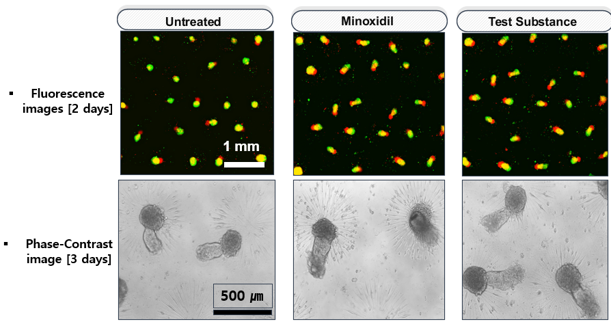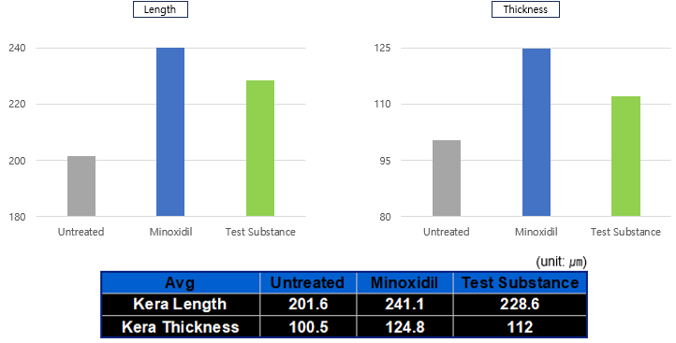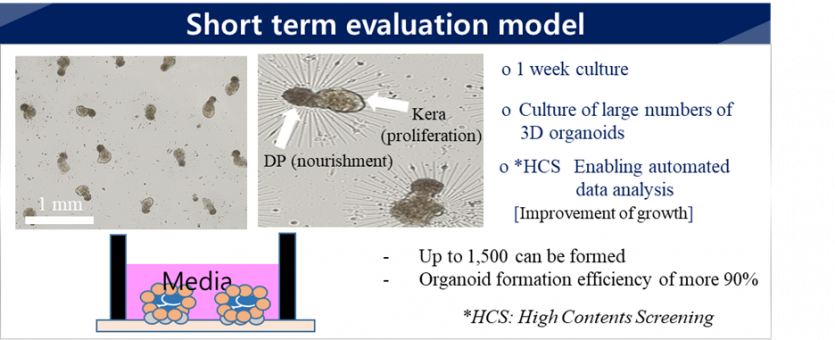자료실
Micro-patterned 3D HF Organoids Candidate Efficacy Evaluation Test
작성자 (주)엘리드
작성일 24-01-23 11:51
조회수 4,818
★ Reference Paper : Biomaterials Research (Impact Factor : 8.1)
Title : High-Throughput Screening of 3-Dimensional Co-culture Hair Follicle Mimetic Tissue with an Enhanced Extracellular Matrix for the Screening of Hair Growth-Promoting Compounds (2024)
Link : https://spj.science.org/doi/10.34133/bmr.0125
① Development Background
As the demand for the efficacy evaluation market increases due to the growth of the hair loss market and the expanding need for animal replacement tests in compliance with the Animal Test Prohibition Act within the cosmetics industry, new efficacy evaluation technology is being developed. This technology is based on the mass manufacturing of 3D hair follicle organoids, which exhibit a strong correlation with the human body.
② Substrates and Principles of
Action
[Introduction to Substrates and Operational
Principles]
■ Controlling the area and size of cell aggregation, organoid density, and spacing between organoids are possible through the low adhesion method employed by biomaterial-fabricated silica.
■ Providing a user-customized 3D spheroid cell culture platform, it involves cells generating organoids and maintaining adhesion. This is accomplished by applying cell-responsive materials onto a non-adhesive substrate, precisely tailored to align with cell characteristics and the intended purpose of use.
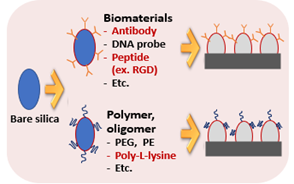
<Silica Particles Coated with Functional Particles>
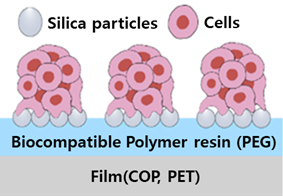
<Substrate Structure>
[Features]
■ Utilizing Fluorescent-Free Film (Cyclo
Olefin Polymer) as the substrate base, allowing for fluorescent observation.
■ Forming highly adhesive 3D spheroids using cell-friendly functional peptides.
■ Enabling automated data analysis through high-content screening (HCS) equipment or individual organoid observation through fluorescence analysis. With the capability to manufacture a large quantity of organoids (up to 60 per well) within 7 days, it ensures rapid acquisition of highly reproducible and reliable results.
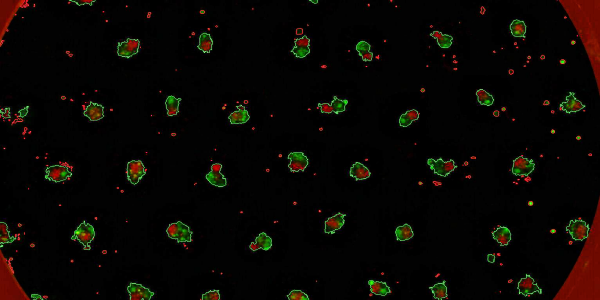
<Organoid
Fluorescence Images Analyzed by HCS Equipment>

<Electron
Microscopic Images of Substrate Patterns and Arrayed Biomaterial-fabricated Silica,
Along with Organoids Grown on the Patterns>
③ Application Areas / Advantages
Optimized for the
specific analysis objectives, the co-culture of dermal papilla cells and
keratinocytes is optimized to efficiently generate a large number of
uniform-sized 3D organoids (60 spheroids/well), which
enables a prompt evaluation of analyte efficacy
within a week, ensuring the analysis results' high reliability and
reproducibility.
④ Experiment Case
Treating manufactured organoids (60 data/Well) with candidate substances and analyzing the results through HCS equipment, we measured an increase of 13.4% in the length and 11.4% in the thickness of keratinocytes compared to the untreated group. By confirming the efficacy of numerous candidate substances through mass experimental results within a short period, this serves as an effective and reliable in vitro efficacy test, potentially replacing animal testing immediately before clinical trials.
